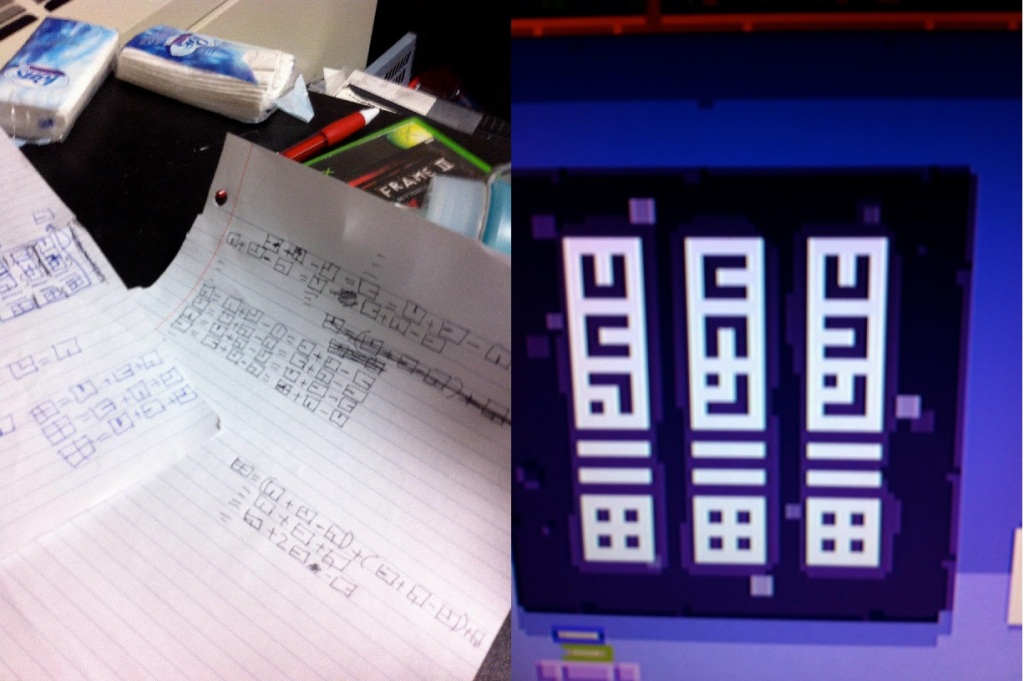FEZ
Polytron
2012
All platforms
Fez is the first video game I had to start keeping a notebook to complete. On the surface, Fez is a classic pixel art puzzle platformer with a twist – all of its 2D environments actually exist in 3D, and by hitting the controller triggers, you can rotate the world to another perspective and see a new part of the level. The primary action is jumping around collecting golden cubes (or, for extra challenge, the purple anti-cubes.) Collect all of them and ascend into the monolithic hypercube for a light show akin to Beyond the Infinite from 2001: A Space Odyssey.
The world of Fez is a brightly colored collection of floating islands, the primary sensibility being comic. In the town where your avatar Gomez lives, his neighbors largely deny the presence of a third dimension, living a life unaware of a world beyond home (the door is on the back of the 3D island.) There is a factory zone where little billboards in some sort of cube language are accompanied by portraits of Gomez’s Doughboy-like kinsmen. Little pixel frogs ribbit and little pixel gulls caw. The animals, little machines, and bouncy mushrooms are all animated with the kind of charm that rewards attention to small details.
But whatever is Beyond the Infinite is encroaching on this world. Breaking into the third dimension seems to have broken something – as you continue to explore, more and more of the world crumbles into what seem to be black holes, tears in the fabric of reality that Gomez can disappear into. (The game is very forgiving with respawns, finding whatever solid ground you last set foot on and quickly depositing Gomez back to where he can stand passively.) The majority of the sense of peril in this game stems from the early career score by John Carpenter synth descendant Disasterpeace (It Follows, Mini Metro, Under the Silver Lake.) Some tracks are peaceful, others majestic, others energizing – but when he aims for horror, the sense of dread that envelops everything still chills me.
After the credits, Fez loops back into a “new game plus” that offers a new first-person perspective and new rewards for earning all 32 golden cubes and all 32 anti-cubes. Doing so involves ascending into Fez’s true difficulty. Fez is not, at its core, a puzzle platformer. The game transcends into a game about archeology. It involves looking for ciphers and decoding ancient language. It involves reading ancient star maps to understand how ancestors looked to the stars. It involves, well, taking notes. The obvious comparison point for games critics in 2012 was Myst. But I haven’t played more than a half hour of Myst – when indie games center on this kind of meta-puzzle, like the brilliant Outer Wilds or this year’s Animal Well, I compare them to Fez.
There is something so immensely rewarding to me about this kind of language game. I’m bad at learning languages in real life – I think in English. I recognize our language’s many, many faults and confusions, but it is the system I understand. While Fez does have a literal language cipher (one that conforms to English directly) it also offers other, less linguistic symbols. Fez doesn’t just challenge the player to solve puzzles – it challenges the player to learn How To Learn. It invites you into a game world with very limited information, gives you everything you need to solve it and hands you the reins to pursue as much knowledge as you care to collect.
The maddening thing about a cipher game is that it is a one-and-done experience. I cannot un-ring the bell. Walking through Fez’s world, the solutions that were once obscure and required meticulous attention to detail are immediately obvious. Being in Fez’s game world is pleasant, listening to Disasterpeace’s score. Some of its platforming challenges are rewarding in the same way replaying a Mario game can be. There are moments of knowing I’ve solved something before but not remembering the exact solution. I used to consider Fez the greatest game I’d ever played. Not being able to recapture that experience will sort of always crystallize it as the best game I played when I was 20 years old.
Fez was a five year passion project, and one of the early examples of a breakout indie game. Unfortunately, Fez ended up being the end of a sentence for its developers rather than the beginning. Even before release, lead designer Phil Fish was considered by entitled gamers to be a blowhard who would never release his game. Then, Fez came out and was extremely buggy, resulting in dismissal from would-be fans (the game works great now.) And then Fish became one of the few male voices standing up to #GamerGate’s bigotry, eventually resulting in him exiting the game industry. Fish will likely never make a game again. The spirit of Fez lives on, but how quickly we silence our own luminaries.
